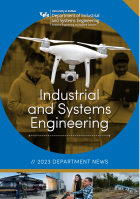Four new transportation grants awarded to ISE faculty

Published December 19, 2017 This content is archived.
Industrial and systems engineering research in transportation and logistics continues to grow. This fall, the Transportation Informatics University Transportation Center (TransInfo) awarded funding to eight new research projects, four of which involve faculty members from the Department of Industrial and Systems Engineering: Dr. Lora Cavuoto, Dr. Qing He, Dr. Jee Eun ‘Jamie’ Kang, and Dr. Jose Walteros. All four projects aim to increase operational efficiencies and safety within the various forms of public transport that are popular today.
Dr. Lora Cavuoto is collaborating with Dr. Fadel Megahed from Miami University and small company Maven Machines from Pittsburgh, Pa., for a research project on predicting changes in driving safety performance on an individualized level under naturalistic driving conditions. According to Dr. Cavuoto, “Transportation incidents remain a pressing public safety issue in the United States and throughout the world, despite significant advancements in vehicle safety technologies. In this project, our team will investigate how driver characteristics, driving conditions, and workload interact to affect driving safety performance changes.” The Maven Co-Pilot is a driver safety device that has been used to collect detailed data on distraction, miles driven, hours into a drive, road location, time of day, and speed profile under naturalistic driving conditions for a cohort of more than 250 truck drivers. This data will be used to model and predict changes in the safety outcome of time between mirror checks. The results of this project will help dispatchers and drivers make more informed decisions regarding scheduling and driver safety interventions to reduce the likelihood of a crash.
Dr. Qing He is using social media data to enhance up-to-date origin-destination demand monitoring. His research will treat geo-tagged social media data as a unique way to sample the human activity space in real time and develop methods to rebuild human activity space using longitudinal social media survey data. “It addresses the three most critical issues in state-of-art travel demand inference with big (passive) data: inaccurate information and sampling bias,” said Dr. He. Traditional household travel survey will be used to provide the ground truth of trip information. Longitudinal travel trajectory and social media data assets produced from this project will also enable new future research on transportation, data analytics, and social sciences.
Dr. Jamie Kang is working in collaboration with Dr. Daniel Rodriques-Roman at Puerto Rico Mayaguez University on a project titled Predictive Analytics for No-Shows and Cancellations for Paratransit Operations. “No-shows and late cancellations waste paratransit operators’ resources, as well as degrade a system’s productivity by preventing other users from utilizing supplied service slots. The objective of this research project is threefold: (i) to develop a classification methodology to predict no-shows and cancellations of trips in paratransit systems, (ii) to incorporate the classification model predictions into trip booking and routing models for paratransit operations (including novel overbooking problems in the context of paratransit), and (iii) to evaluate the value of the classification models’ predictions in paratransit planning and operations,” said Dr. Kang. As part of this project, the researchers will collaborate with Puerto Rico’s Metropolitan Bus Authority to develop and apply the data analytic techniques proposed in the project using data from the LV paratransit system previously discussed.
Dr. Jose Walteros’s project involves improving the service quality of bike sharing systems via the analysis of real-time user data. The principal objective is to develop a predictive statistical framework to efficiently estimate the ability of a bike-sharing system to serve incoming bike requests. By mining user data collected from the system's smartphone app, an operator can utilize the proposed models to predict the likelihood that any potential user who desires to use the system decides to do so under the given the system's conditions the user encounters. “Bike sharing is an innovative urban transportation alternative that provides citizens fast access to bicycles for inner-city commuting. These type of systems are known for bringing significant benefits to its users in the form of a healthy and efficient transportation option, and to cities as an effective way of reducing CO2 emissions and traffic,” said Dr. Walteros.
The grants were awarded to support graduate student education in transportation informatics. The research projects support the TransInfo mission to undertake research, education, and training and technology transfer activities aimed at realizing the full potential of Big Data and Transportation Informatics, effecting change in system performance, guiding investments and improving policies.
View the full list of funded projects in the TransInfo newsletter.
